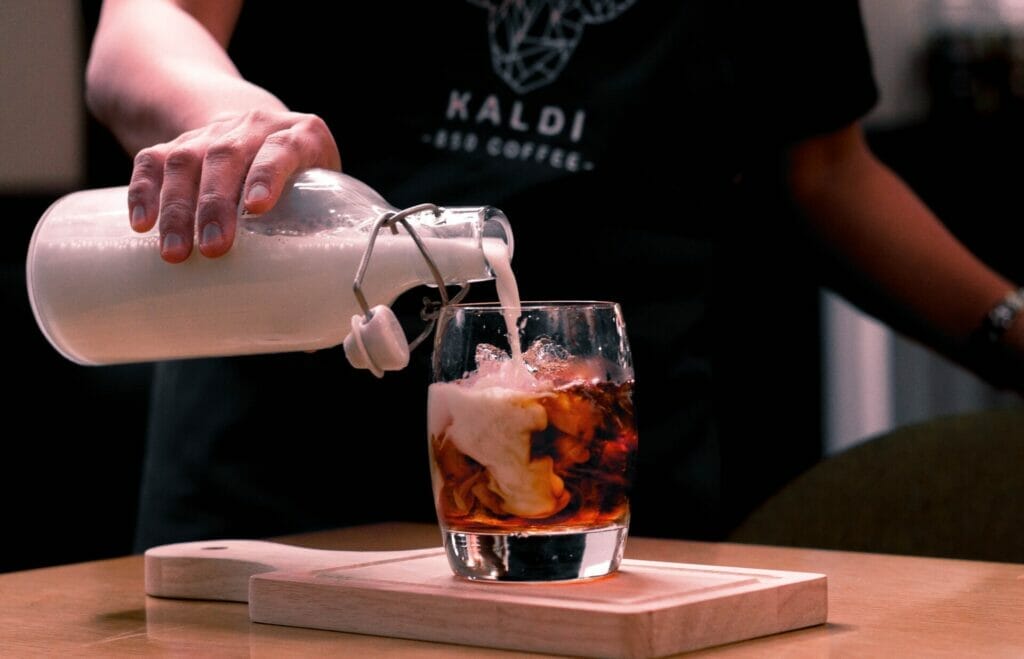Does Coffee Go Bad If Left Out?
The short answer to the question, “Does coffee go bad if left out?” is yes. Coffee beans can absorb moisture and oxygen from the air, causing them to lose flavor, and aroma and weaken in strength when exposed.
It can also be contaminated or compromised by bacteria or other substances that may have been present in the environment it was left in. While an unopened package of bean coffee will take longer to spoil, the effects of leaving coffee out are still noticeable after a few hours.
In addition, you should always avoid leaving your coffee black for more than a couple of days as this could lead to mold growth due to humidity and warm air entering the container. The best way to ensure that your french press coffee stays fresh is to store it in an airtight container away from sunlight, heat, and moisture so that its flavor and aroma remain intact.
What Happens If You Leave Your Brewed Coffee Out?
The Flavor Will Degrade
If you’ve brewed a pot of coffee and don’t plan on drinking it all immediately, then you should know that leaving your coffee out can drastically affect the flavor. It’s true – when brewed cold coffee is left out, the flavor will degrade.
As soon as the coffee cools down, oxygen begins to interact with it, causing some of its complex flavors and aromas to evaporate. This process happens quickly and makes your ground coffee taste stale and flat. So to keep your cup of joe tasting great for as long as possible, it’s best to store or refrigerate brewed coffee after a few hours.
That being said, there are still certain ways you can enjoy leftover brew even if it does taste a bit off. For instance, adding milk or sugar will help mask some of that stale flavor. You could also use it for iced coffee instead!
There are an endless amount of possibilities when it comes to reusing old coffee – just make sure you don’t leave it sitting out if you want to get the most flavorful cup every time!
The Milk In Your Coffee Will Spoil In Just Two Hours
If you leave your freshly brewed coffee out, the milk in it will spoil after two hours. That’s right– even if you left your coffee sitting on the counter, its milk can go sour or develop bacteria and mold after just two short hours. This means that it’s not safe to drink anymore and should be discarded immediately.

That’s why it is always important to refrigerate any unfinished brews within those two-hour windows. Doing so will prevent any unwanted microorganisms from growing in your precious cup of joe, thus retaining its freshness and taste! So make sure to keep an eye on the clock when brewing and keep your brewed coffees cool until consumed for the best results.
Coffee Oils Will Oxidise Over Time
When coffee is brewed, the oils from the beans are released into it and contribute to its unique aforementioned aroma compounds and flavor. However, if you leave your brewed coffee out for too long, these oils will start to break down and oxidize due to exposure to touch with oxygen in the air.
This causes the coffee to lose its freshness and flavor as the oils become duller and less potent over time. Additionally, oxidized coffee can also acquire a sour or bitter taste which may not be very pleasing to many people. Therefore, it is best to drink together a freshly brewed iced coffee treat soon after it has been made so that you can enjoy its full rich flavor with every sip.
There Will Be No Loss Of Caffeine Content
It is safe to say that leaving your brewed coffee out will not cause any loss of caffeine content. That’s because caffeine is a highly heated and stable compound, meaning that it won’t degrade or break down when exposed to heat while the plain coffee is being brewed.
After brewing, the caffeine molecules become locked into the beverage and are no longer affected by outside elements such as contact with oxygen or light. Thus, even if you leave your brewed coffee out overnight, it will still contain the same level of caffeine that it did when you first brewed it!
So go ahead and enjoy your coffee without fear of losing your daily dose of energy-boosting caffeine – just make sure to seal up the storage container tightly after brewing to keep its flavor and aromatic compounds.
Molds And Bacteria May Begin To Emerge
If you leave your brewed coffee out, molds and frequent bacteria may begin to emerge. It’s important to note that the water in brewed coffee is generally a hospitable environment for unwanted organisms like the ground for bacteria, fungi, and mold to establish themselves and multiply.

That’s why it’s important not to leave brewed coffee out for more than a few hours. Over time, these microorganisms can affect the flavor and shelf life of the brew.
If left untouched, molds can form on the surface of the coffee, giving off an undesirable taste when consumed. Bacteria can undermine the smoothness of your coffee flavor as well as cause health issues if consumed.
Thus, it’s always recommended for brewed coffee to be consumed within two or three hours of brewing. If this isn’t possible, store away any excess amounts safely in the refrigerator or freezer until needed for consumption!
How Does Leaving Your Coffee Out Effect The Caffeine Content?
When you leave your coffee out, it can have a significant effect on the daily caffeine content of the brew. It’s been found that leaving coffee exposed to air causes the caffeine to break down over time, resulting in weaker and less flavorful coffee.
This breakdown is accelerated by heat, so if you’re leaving your morning coffee out in a hot area, you’ll be seeing even faster deterioration. Furthermore, exposure to light also promotes a decrease in caffeine kick content, as well as an increase in acidity levels.

In conclusion, if you’re looking for a tasty and energizing cup of joe then it’s best to store your best-tasting coffee in an airtight container and keep it away from sunlight. This will ensure that your milk-based coffee beverages still have the same amount of caffeine level that was originally intended when brewing!
Leaving Out Coffee Containing Milk
Leaving out fresh coffee containing milk is an increasingly common problem and can cause an unwanted mess. If you’re like most people, you’ve likely left out a mug of your favorite hot cup of joe before, and ended up with a puddle of spilled milk all over the counter.
To avoid this issue, it’s important to remember to store coffee-containing milk safely, so that you don’t have to worry about waste or clean up afterward.
This means keeping your brew sealed tight in containers and ensuring they are kept at an optimal temperature range (both too cold and too warm can cause spoilage). Additionally, be sure not to let it sit out for extended periods – if possible it should be consumed immediately after brewing or cooled down quickly after.
Leaving Out The Coffee Beans
Leaving out the coffee beans can be a costly mistake. Whether you are trying to make a quick cup at home or brewing a pot in your office, scorched coffee beans can quickly ruin your brew.
When you leave them out, there’s nothing to protect against excessive heat and overexposure to light. This can cause the beans to become dry, and brittle, and lose their flavor profile. Not only will this affect the taste of your coffee, but it can also yield an inferior quality of beans if brewed for too long.

So if you want to get the most out of your beans, be sure to grind them up fresh each time you brew. Don’t let them sit out for more than a few minutes and place them in an airtight container after using them so they don’t become exposed to the elements. Taking these simple steps will ensure that you get the best-tasting cup every perfect time!
How Long Does Brewed Coffee Last In The Fridge?
If you’ve brewed some black coffee and you’re wondering “How long does brew black coffee last in the fridge?”, then we have the answer for you. Generally, brewed black coffee lasts about 4-5 days when stored in an airtight container and kept chilled in the refrigerator.
This means that if your brewing process yields more than enough to fill up a cup, there’s no need to throw out what’s left over – just store the remainder away and taste it within 5 days or 120 hours after brewing. Pro tip: adding a tablespoon of sugar in coffee to your brew can help extend its longevity by providing an extra layer of flavor that will be retained even after chilling.
So, whether you make too much to enjoy at once or simply want to store up some cup-ready brew for later in the week, now you know how long it will last in the fridge – 4-5 days!
Is It Ok To Drink Coffee Left Out Overnight?
Many people have questions surrounding whether it is safe to drink day-old coffee left out overnight. The short answer is no, it’s not recommended to consume coffee that has been left out overnight. Not only can the taste of the coffee degrade, but there is also an increased risk of bacteria growing.
When you leave hot coffee uncovered to sit out at room-safe temperature or in a warm environment, it exposes the liquid to an oxidation process and breaks down the flavors the entire time. This will lead to an earlier stale coffee taste and give the coffee a stronger harsh bitterness than usual.

Can You Get Sick From Drinking Coffee That’s Been Sitting Out?
The question of whether you can get sick from drinking coffee that’s been sitting out for extended periods is one that is often asked. While it might not be pleasant to have a cold brew concentrate or a stale cup of coffee, chances are very good that the coffee won’t make you sick.
That said, there are some things to keep in mind before gulping down that cup of joe. Cold Brew Coffee that has been sitting for more than two hours isn’t going to taste as fresh and flavorful as it could have — and this could lead to a less enjoyable experience.
As well, built-up bacteria on the coffee ground beans or receptacle can also present an issue when it comes to drinking coffee that’s been sitting out for extended periods.
